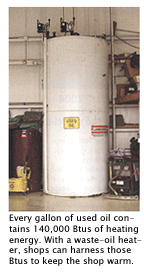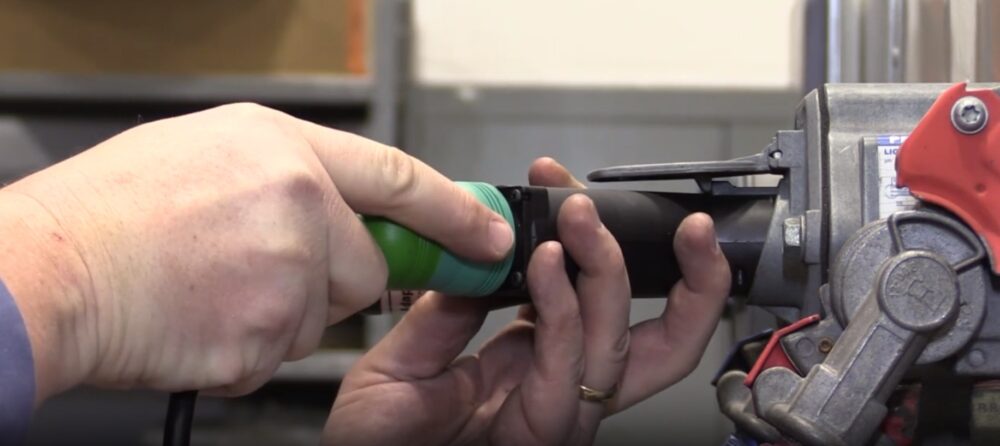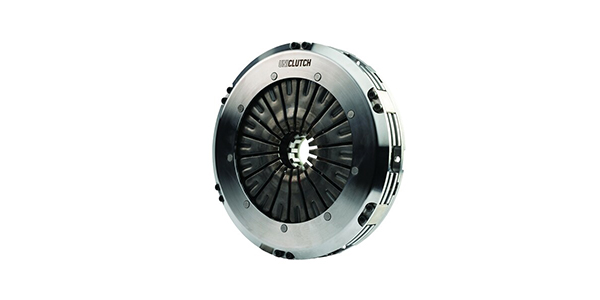Generating waste is not too difficult for most automotive repair shops. Getting rid of it is what often poses a problem, especially when the waste in question is something that is as environmentally damaging as used automotive fluids. When it comes to disposing of hazardous waste, shop owners need to understand their state’s regulations, establish written procedures for handling the waste, and train employees on how to handle and store the waste.
Shops that do not have the resources needed to manage the hazardous waste their shop produces, have the option of turning to an outside environmental services company who will handle this waste for them. The following are some questions to ask when evaluating an environmental services company:

What services does the company provide? Are collection drums supplied and clearly labeled? Can the company properly handle the used oil, filters and other wastes every step of the way, or will several firms be needed to get the entire job done?
Does the company have the proper federal and state environmental permits and does it comply with all environmental regulations? For example, the EPA uses 12-digit identification numbers to track used oil. Transporters hauling used oil must have a valid EPA ID number, and generators, such as automotive service or repair shops, can only use transporters with EPA ID numbers for shipping used oil off site.
Does the company keep operating records, including inspection and training records?
Are the facilities that are processing the oil fully and regularly audited?
Does the company have sufficient insurance or assets to protect its customers in the event of an accident, cleanup operation or legal proceedings stemming from the handling, treatment or disposal of the used oil and oil filters?
Have the company’s service representatives received documented training on environmental regulations and United Nations/Department of Transportation (UN/DOT) requirements, and do they have access to specialists who can be consulted if necessary?
Used Oil
One fluid almost every shop has a lot of is used oil. Two common ways used oil can be disposed is by hiring a service to come in and remove the oil and by using it for fuel for a waste-oil heater. According to the Used Oil Management Association (UOMA), used oil generators have a cradle-to-grave liability for its proper disposal.
All generators of used oil are responsible for the oil from the moment it is generated or collected until it is processed or burned. The laws and regulations that govern the proper handling and disposal of used oil were created to ensure environmental protection and resource conservation.
This cradle-to-grave liability for used oil also helps ensure that generators and collectors of used oil fulfill their responsibility to their communities through safe and proper disposal.
For many shops, used-oil heaters have become a safe and economical way to dispose of used oil while keeping the shop’s heating bills in check. With the projected increase in heating costs this winter, more shops may be turning to waste-oil heaters to help offset this increase. Every gallon of used oil contains 140,000 Btus of heating energy. With a waste-oil heater, shops can harness those Btus to keep the shop warm. Recycling your own used oil in-house also saves money since you don’t have to pay anyone to come haul it away and you are also able to avoid some potentially uncomfortable EPA pitfalls. The UOMA maintains that a used oil-fired heater can typically pay for itself in two years.
Oil Filters
Used oil filters are exempt from federal hazardous waste requirements as long as the filters are not terne-plated and have been properly drained (i.e., hot-drained) of used oil.
According to federal regulations, a facility can dispose of filters as solid waste (in some states) provided that the filter has been hot-drained to remove residual used oil. (Hot draining means the filter was removed from a warm engine and drained immediately.)
According to CCAR-GreenLink, there are four methods of hot draining that are used by service shops:
Gravity Draining: When the filter is removed from the engine, it should be placed with its gasket side down in a drain pan. If the filter has an anti-drain valve, the “dome end” of the filter should be punctured with a screwdriver (or similar device) so that oil can flow freely. Then allow the filter to drain for 12 to 14 hours.
Crushing: Crush the filter by using a mechanical, pneumatic or hydraulic device to squeeze out the used oil/fuel and compact the remaining filter materials.
Disassembly: Separate the filter into its different parts using a mechanical device. This allows most of the used oil/fuel to drain from the filter, and the metal, rubber and paper parts of the filter to be recycled separately.
Air Pressure: Place the filter into a device where air pressure forces the used oil/fuel out of the filter.
Used oil filters storage containers must be protected from wet weather by a cover, either indoors in the shop, or if outdoors, in a shed or lean-to. In addition, make sure the container can hold any used oil that seeps from the filters.
Antifreeze
When storing used antifreeze, shops should keep it in containers that are closed except when actually adding or removing liquid. This used antifreeze should be stored in its own container, not mixed with other liquids. The container also should be properly labeled so it is clear what is inside the container.
Shops must determine if the used antifreeze is hazardous waste and then dispose of it properly. If your facility contracts with an outside recycler, check with them to see if they will haul away your used antifreeze
. Specific guidelines on how to determine if used antifreeze is hazardous or not, as well as information on disposing of the antifreeze can be found on the CCAR-GreenLink website at www.ccar-greenlink.org.
Brakes
If your shop performs brake service, precautions need to be taken when disposing of spent brake washing solvent, any used filters from a HEPA vacuum that may contain asbestos and any brake pads that contain asbestos.
When dealing with the spent solvent, shops must first determine if it qualifies as hazardous waste. If the solvent does qualify, this is most likely due to its flammable characteristics, not its asbestos content. This solvent should be considered hazardous waste and treated as such.
If your shop has an outside company come and haul away your used oil and other liquid wastes, check with them to see if they will also take your used brake solvent. If your shop has a HEPA vacuum, the used filters should be kept wet to limit the dust, and placed in leak-tight wrapping. They should then be placed in labeled containers until they can be hauled away by a licensed hazardous waste disposal company.
If you suspect that asbestos is present in any used brake pads in your shop, these need to be disposed of by contacting the brake manufacturer or a recycling company that collects used pads for recycling.
Shop Rags
Does your shop have a set of guidelines for handling used shop rags? According to the EPA, shops have a few options for cleaning or disposing of these rags. One approved method is sending the used rags/towels off site to be laundered. The rags can often be sent right along with technicians’ uniforms.
Shops also are permitted to burn these used rags in the shop’s used oil burner or to send them to an off-site used oil burner. Burning, however, doesn’t mean you can just throw them in a barrel out back and then light the pile with a match. This is not allowed. Shops should not dispose of used rags with their normal trash each day. Used rags need to be treated as hazardous waste.
If a shop uses an EPA-licensed hazardous waste transporter to carry away their used motor oil, more than likely these transporters also will accept the used shop rags.
Whether an automotive repair shop decides to handle its used oil, oil filters and other hazardous waste internally or use an outside provider, it pays to do the research and be prepared. Having a solid understanding of environmental regulations, evaluating your resources and thoroughly investigating environmental services providers is the only way to determine what’s best for the bottom line of your business.


